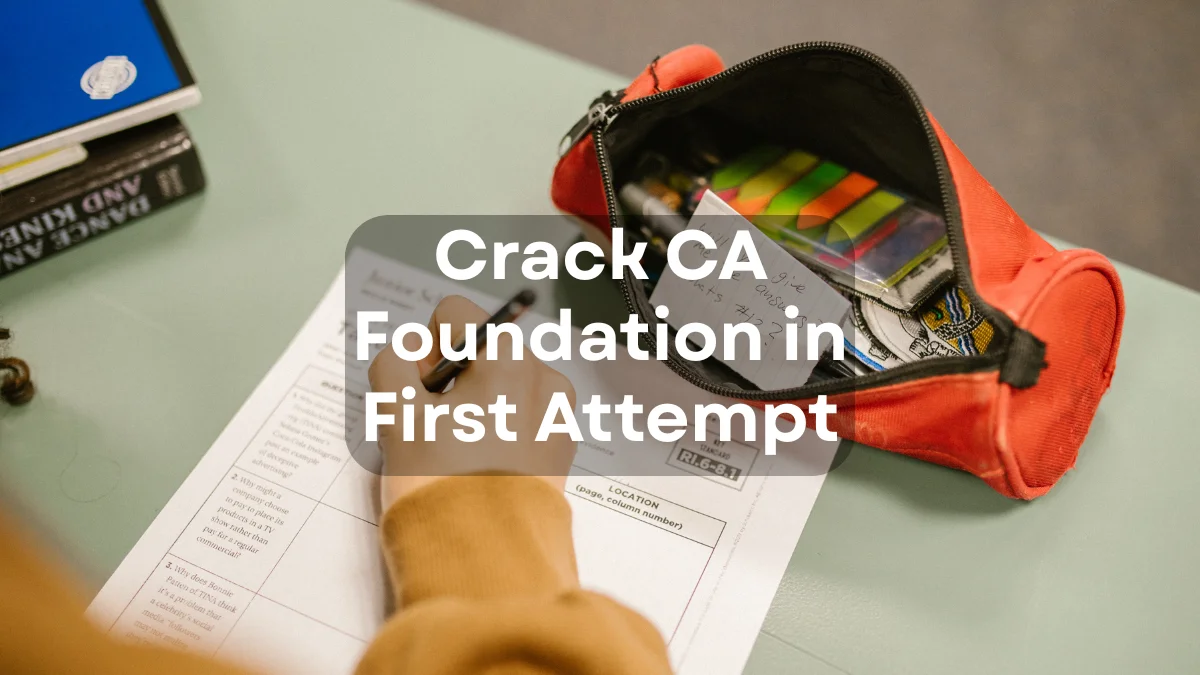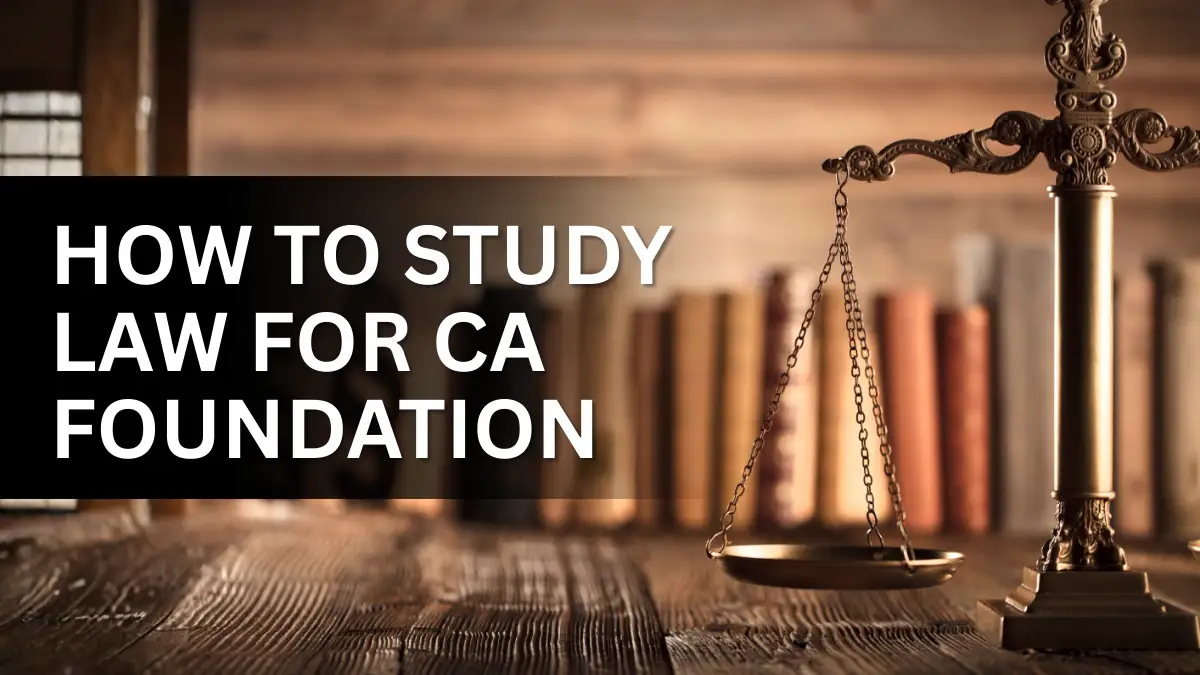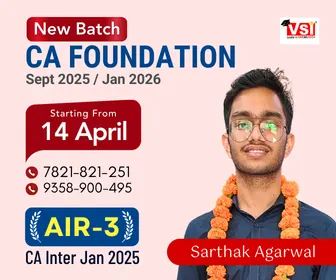Wondering how to crack CA Foundation in first attempt without stress or coaching? You’re not alone—and yes, it’s 100% possible. All it takes is the right study plan, smart revision, and consistent practice. This guide will show you proven strategies to help you crack the exam on your very first try.
What is CA Foundation?
The CA Foundation Course is the entry-level exam conducted by ICAI (Institute of Chartered Accountants of India). It has four papers:
- Paper 1: Accounting (subjective)
- Paper 2: Business Laws (subjective)
- Paper 3: Quantitative Aptitude — Business Mathematics, Logical Reasoning & Statistics (objective)
- Paper 4: Business Economics (objective)
You must score at least 40% in each paper and an aggregate of 50% total to pass. Scoring 70%+ overall earns a “Pass with Distinction”.
Latest pass percentage (May 2025): only 15.09% of students cleared it (16.26% males, 13.80% females).
Why First-Attempt Success Matters
Given the low pass rate (around 15%), clearing the CA Foundation first time saves time, costs, and emotional energy. Many high achievers—including those from Jaipur and Nagpur—used structured plans, self-study discipline, and repeated revision to succeed in their first attempt.
Preparation Timeline: Four-Month Minimum
ICAI requires a minimum four‑month study period before you sit for the CA Foundation exam. Register at least four months prior to the exam month (e.g. register by January 1 for the May term).
Step-by-Step Study Plan
1. Understand Syllabus & Exam Pattern
Map out each paper’s structure, syllabus, marks distribution, and types of questions. Knowing how subjective vs objective papers are weighted sets your study priorities.
2. Make a Balanced Study Plan
- Daily routine: 6–8 hours of focused study is realistic; claims of 15 hours/day are unmanageable and often burnout‑inducing.
- Divide time across all four papers to avoid imbalances.
- Prioritize weaker subjects early, like Business Mathematics or Law, if they are your challenges.
3. Use Exam-Approved & Quality Materials
- Always start with ICAI’s official study modules and RTPs.
- Supplement with reputable reference books or online video lectures for clarity.
4. Focus on Conceptual Clarity
Avoid rote learning. For Accounting, focus on understanding journal entries, ledgers, and financial statements. In Economics and Math, grasp the “why” behind formulas and logical arguments.
5. Regular Revision (Multiple Rounds)
Most toppers review each part at least three to four times. Build concise handwritten revision notes, highlight formulas, case laws, statistics, and economic definitions for quick recall.
6. Timed Practice: Mock Tests & Past Papers
- Simulate exam conditions to strengthen time management.
- Solve full mocks weekly, then past ICAI papers to grasp trends and frequently asked topics.
- Identify weak spots and refine them.
7. Final-phase Smart Review
In the last 30–45 days:
- Focus purely on revision and mock practice.
- Avoid new topics—just skim through everything learned so far.
- Spend light time on Business Laws and Accounting daily in the final month to avoid forgetting.
Mindset, Stress & Health Management
- Stick to a consistent schedule—many successful candidates studied 7–8 hours daily rather than 15.
- Include physical activity, healthy diet, and proper sleep.
- Take short weekly or daily breaks to recharge mentally.
- Practice stress-reduction techniques like mindfulness or breathing exercises.
Subject-Wise Tips
Accounting (Paper 1)
- Practice varied journal, ledger, trial balance, adjustment, and final accounts problems.
- Clarify all types of accounting concepts and their treatment.
Business Laws (Paper 2)
- Prioritize Indian Contract Act, Sale of Goods Act, and LLP/Company law sections.
- Use flowcharts and mind maps for easy revision.
- Business correspondence and reporting: practice writing letters/reports with precision.
Quantitative Aptitude (Paper 3)
- Focus on Business Math, Logical Reasoning, and Statistics.
- For math‑weak students, devote extra time early; for strong students, revise key formulas regularly.
Business Economics (Paper 4)
- Relate theory to real-world examples for better retention.
- Stay updated on current commercial knowledge and recent business developments.
Gap-Filling Tips: What Others Don’t Emphasize
- Health/stress management: many guides skip how mental wellness impacts results.
- City‑based stories: real examples from Jaipur and Nagpur show first-attempt strategies and manageable study hours
- Balanced daily effort: avoiding burnout is crucial—7‑8 hours daily is proven effective.
- Use of official mock tests and worksheets from ICAI—not just third-party materials.
- Smart revision scheduling: last‑month focus on repeated overview, not new learning.
Summary Checklist
Frequently Asked Questions
Q: Can I crack CA Foundation in less than 4 months?
ICAI mandates a minimum four‑month valid study period between registration and exam date.
Q: Is self-study enough?
Yes—as many first-attempt toppers achieved success through disciplined self-study and structured planning (e.g. Jaipur’s Parth Amarnani, Nagpur’s Ishant Tejwani).
Q: How many mocks are ideal?
At least 2–3 full mocks per week in later stages, plus official ICAI mock tests to simulate real exam settings.
Q: What if I fear running out of content before the exam?
Revisit strong chapters first, then skim weaker ones. Avoid covering brand-new topics in final days—focus on consolidation.
Final Words
The journey to clear CA Foundation in your first attempt is definitely difficult—but not impossible. With a strong understanding of syllabus, disciplined study schedule, repeated revision, smart practice, and attention to mental well-being, you can join the select ~15% who succeed in their debut attempt. Prioritize concept clarity, official materials, strategic mocks, and health.
All the best—believe in yourself and start now!









